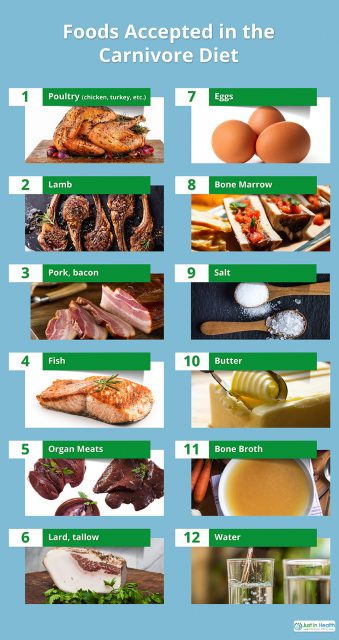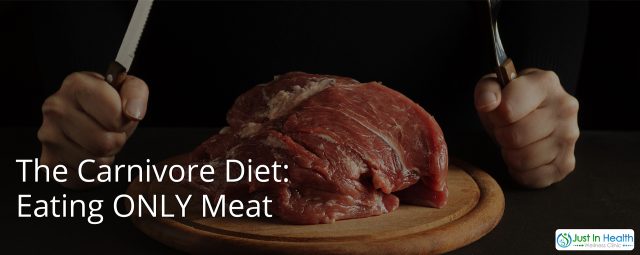
By Dr. Justin Marchegiani
The Carnivore Diet has recently gained a lot of popularity. In essence, the diet is very simple: just eat meat. The concept of eating only meat can be hard to wrap your head around- it goes against everything we’ve been told: fresh fruits and vegetables are important for well-being, meat causes heart disease, without fresh produce you can get scurvy, etc. Today we’re going to review the Carnivore Diet and debate some of the most common misconceptions.
It is a high protein, moderate fat, and virtually zero-carb diet. The diet consists predominantly of meat, although some people allow other animal products such as butter and eggs. No fruits, vegetables, or grains allowed. While a common result of this diet is weight loss, people primarily start eating carnivore to address autoimmune conditions.
At its core, the Carnivore Diet is a meat-only diet. However, like with all diets, there are some grey areas. It is up to each individual to decide what works best for them. Since a large portion of those who start this way of eating do so to overcome health challenges and autoimmune issues, many choose to stick to meat-only. However, others choose to include other animal products as well.

The staple food of the carnivore diet is beef: ground beef, steaks, simple sausage. Those who follow this diet report feeling the best and having the best results with beef. Other foods allowed on this diet include:
The grey area includes animal products such as yogurt, milk and cheese; as well as teas and coffee. Whether or not to include these items is completely up to each individual!
Here’s an example day of meals for someone on the Carnivore Diet. Keep in mind, this is structured after the typical 3-meals a day template most Americans abide by. However, most people on the Carnivore diet find that they can go much longer between meals. Meat is full of fat and protein, which can keep you satiated much longer.
Breakfast: Three eggs cooked in butter with a few slices of bacon.
Lunch: Rib eye steak.
Dinner: Hamburger patties with cheese.
Notice the lack of snacks; one of the advantages of the carnivore diet is the fullness factor of the high-protein consumption. Some people skip breakfast, others choose to eat just 2 meals per day (ex: the first around 11 AM and the second around 5 PM).
It’s important to note that this way of eating has not been heavily studied, so most evidence is anecdotal. Many people suffering from extreme autoimmune conditions have found solace in the Carnivore Diet. When nothing else could provide them relief, meat was their saving grace.
This diet is thought to heal due to the anti-inflammatory aspect of eating meat. In a sense, this is an extreme elimination diet which gets rid of any possible food sensitivities or triggers. The Carnivore Diet has reportedly cured autoimmune conditions, depression, binge eating, and chronic pain.

Those who have tried the Carnivore Diet to heal their chronic illnesses rarely even mention the weight loss, because for them, it seems insignificant compared to the feeling of being healed after years or decades of living in illness! But nonetheless, the Carnivore Diet has also been shown to dramatically help with weight loss and muscle toning.
There are many reasons why the Carnivore Diet is so effective for weight loss. Firstly, you’re eating mainly protein and fat, which provide satiety and it eliminates mindless eating.
Additionally, you’re more than likely to switch into ketosis on this diet. When you’re in ketosis, your body is burning fat for fuel, rather than carbohydrates. So your body will essentially use the extra fat you’re carrying on your body to give you energy!
There are several myths and common concerns regarding this diet:
“Too much meat can cause kidney problems.” This is more of a concern for people who have preexisting kidney conditions. If you are going into this with strained kidneys or kidney disease, then your filtration system is already impaired and higher amounts of protein may be an issue. But if your kidneys are healthy, then the protein should be just fine!
“Eating only meat causes scurvy.” A common misconception is that eating only meat can cause vitamin deficiencies. First of all, meat does contain small amounts of vitamin C. Secondly, in a carbohydrate diet, we only require 10 mg/day of vitamin C to prevent scurvy. What’s more— research shows when on an all-meat diet, we require even less vitamin C to stay healthy.
“Won’t you get super constipated?” Those on the Carnivore Diet have reported that, although it may take a week or so for your body to adjust, this diet does wonders for their colon and bowel movement regulation!
“Isn’t meat bad for you?” Please read our article on red meat’s supposed link to cancer. Essentially, the study that went viral was sensationalized, and there were a lot of factors that were overlooked. It is my firm belief that grass-fed, organic, free-range meats are healthy for you, no matter what diet you’re on! Quality matters.
If you decide to try the Carnivore Diet, be sure to choose fatty cuts, and don’t be stingy with the salt! Follow your intuition- if you want to throw a slab of butter on top of your steak, or want to choose the fattiest meat cuts you can find- do so! Don’t start this diet primarily to lose weight, and then start counting calories. Your body requires fat and plenty of electrolytes to stay healthy. If you skimp on the salt, you will notice. Headaches will probably be your first clue! Additionally, be sure to drink plenty of high-quality water (filtered water, or spring water if it’s available!). You might even consider sprinkling some salt into your water to keep yourself hydrated.
As we’ve noted, people with chronic illnesses and autoimmune diseases are among the finest candidates for the Carnivore Diet. If you have been suffering from undetermined food intolerances, you might consider the carnivore diet as a short-term elimination diet to uncover your trigger foods.
Anyone with kidney disease or eating disorders should think twice before diving into the Carnivore Diet. We advise anyone considering this way of eating talk to a functional medicine practitioner to better advise on an individual-basis.
Is the Carnivore Diet right for you? Click here to ask a functional medicine doctor!